When I wrote So You Think You Want a Newfoundland. Here’s 9 Things You Need To Know it was over 7 years ago.
I wrote it with the hopes that people who were thinking about adding a Newfoundland to their family would be familiar with what to expect.
I thought it was a pretty good article back in the day but now that I think about it, it’s average.
I thought coming from someone that actually is owned by Newfies and knows the breed pretty well that it would be authentic and help guide anyone looking to see if a Newfoundland was right for them.
What I see now when I’m taking a deeper dive into trying to find out why so many Newfies are ending up in rescue over the past 3 years is that it’s basically nothing new.

I mean, it’s nothing new in regard to the articles that are on the web because it’s basic.
Everyone knows that Newfies shed and drool.
Everyone knows that Newfies can be expensive and they have a shorter lifespan than other breeds.
But things have changed quite a bit, not so much with the breed itself but with the world around us.
We’ve been through it the last few years and we’re still going through it.
From a pandemic to contaminated water to unprecedented weather conditions to dangerous air quality alerts, life as we knew it is not the same as it was back in 2016.
We are raising Newfies in a different world and it can be tough.
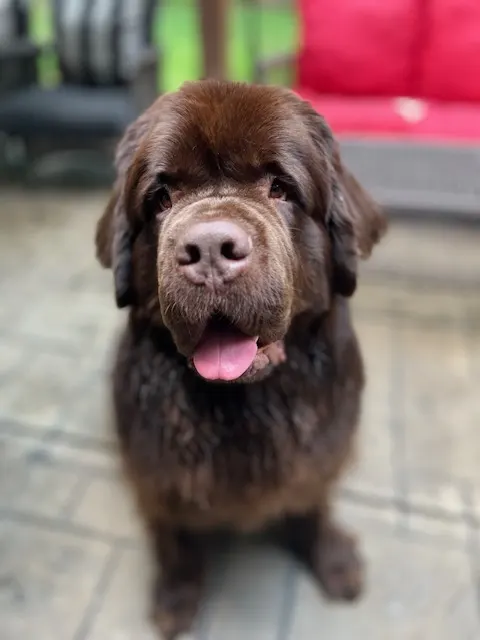
Newfies Are In Rescue Groups Across The Country
Every day when I’m scrolling through my social media I see at least a dozen Newfies that have either just come into rescue and are being vetted or Newfies that are ready to find their forever home.
Over the last 3 years, Newfie-specific rescue groups are drowning in Newfies that have been surrendered to them.
Here are 5 of the top reasons why Newfoundlands are ending up in rescue:
- Lack of knowledge about the breed
- Cost of care
- Lack of time
- Financial hardships/health crisis
- Lack of training
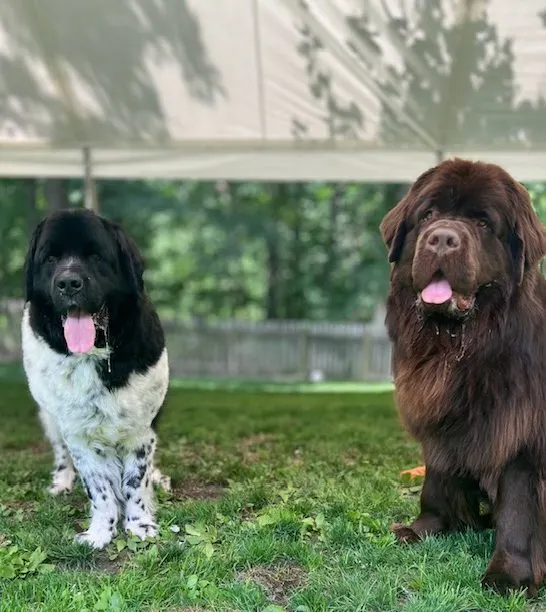
Lack Of Knowledge About The Breed
This is a huge one and one of the main reasons why started this blog over 10 years ago.
When we are researching things about the Newfoundland we are always met with the description of a fairy tale Newfie.
Loving, gentle giant, lazy, nanny dog, easy to train and the best friend you could ever have.
People are shown the very best qualities and traits of the breed so most people are sold right away.
I don’t blame you, the “description” is delightful and I fell for it too many years ago.
The description isn’t wrong, it’s just not the whole story.
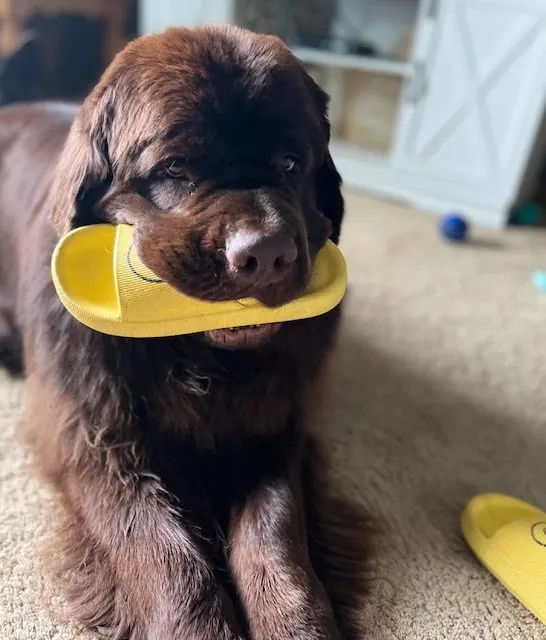
RESULTS MAY VARY
What you see and read online is a mature adult Newfie which is almost a totally different dog than the teenage Newfie in front of you right now.
Basically, if it sounds too good to be true, it probably is and that is true with any dog breed.
Picture Perfect
Most every person that I talk to says that they wanted the Newfie they saw in the pictures.
They want the perfectly groomed Newfie that sits pretty for pictures that they see all over social media.
Here’s the thing, Newfies get disheveled fast.
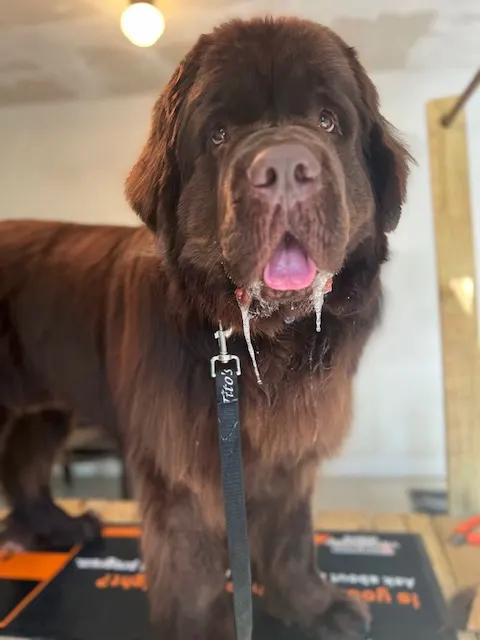
80% of the time they don’t look perfectly groomed.
Their coat is HIGH maintenance and often crunchy.
And behind every “well-behaved and model Newfoundland” is an owner who has trained them for YEARS.
You need to put the work in.
Adolescent Stage
I’ve talked about the adolescent or teenage stage of Newfies A LOT but I still don’t think people get it.
This stage can be HARD and many young Newfies are surrendered to rescue or shelters because it can be so challenging for new owners.
This stage is very similar to other adolescent dogs of different breeds but it’s with a 100-pound dog which can make it scary.
You very well might need a helpful hand during this stage and that’s ok.
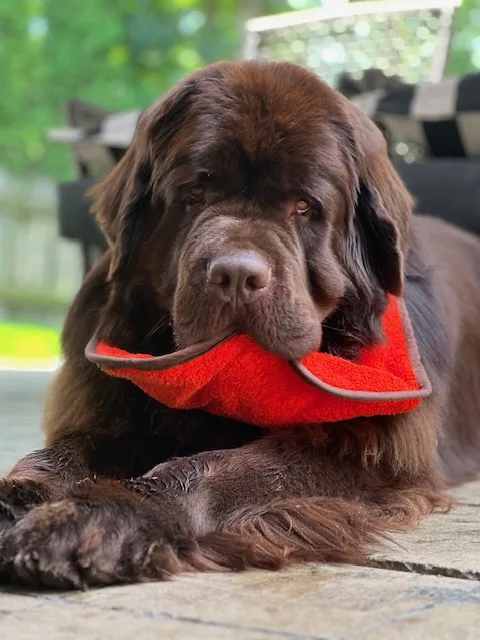
Every Newfie goes through this stage, some more intense than others and I feel that if more people saw this stage before getting a Newfie, they would opt out.
Raising a Newfie is a 4-stage program and this seems like the longest stage but it does end.
This stage is hard and we as a community should be acknowledging that more.
There is a reason that I took a 2-year gap before I got Lou, I needed to mentally and physically prepare for it.
No one is failing this stage but many do struggle. That’s ok.
Cost Of Care
We covered this in a lot of articles here but it’s gotten even MORE expensive to own a Newfoundland over the past 3 years.
The cost of living is higher.
EVERYTHING has increased
Vet care, grooming tools, professional dog groomers, dog food and everything else cost more.
Not to mention it’s hard to get in to see most vets.
Utility bills have risen, which means for me, in order to keep my Newfies comfortable in the summer, my electric bills have almost doubled.
My water bill is up, my gas bill is up and my pet insurance premium is up.
Every professional in the pet care world has had to increase their cost of services.
This hits any dog owner in their bank account but especially giant breed dog owners.
(My pet insurance premium for 3 dogs is to the point where I second-guessed renewing it this year because it’s getting close to being out of my budget.)
Financial Hardships
People are losing their jobs or having to relocate to keep their jobs.
People are getting sick and no longer able to pay to care for themselves let alone their pets.
People are having to sell their homes because they can’t afford it anymore and they can’t take their dog because so many rentals, hotels or apartments don’t allow BIG dogs.
While I hope that no one has to endure these hardships, they are out of our control but they should still be kept in the back of your mind.
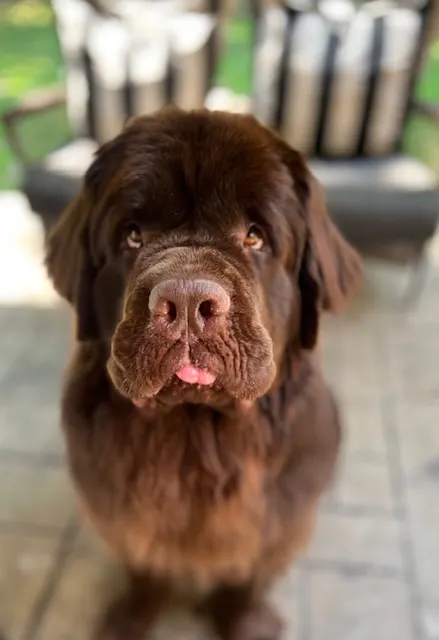
Lack of Training
We always say, “Never stop training.” but people always stop training after they think they’ve covered the basics and then they blame themselves.
A Newfie isn’t born to be a giant giant, they evolve into one over time.
Training is a big part of owning a Newfoundland and it takes consistency and different approaches depending on the individual dog.
I train Odin differently than I train Lou.
And with Lou, he really taught me to re-evaluate some of my training techniques because I wasn’t delivering in a way he understood.
Basic Training Is Overrated
Obviously, training is important and never stops BUT sometimes I feel that basic training is just the tip of the iceberg and most people don’t venture past that.
Newfies have a lot of different traits and characteristics and if you don’t understand those, you’re going to have a hard time.
They also have many of the same common behavior issues seen in other breeds but they’re also different which is again, why it’s super important to get a good understanding of the breed.
For example, being mouthy.
A mouthy Newfie is common and it’s not always a bad thing. (Newfies are working dogs that often use their mouth when working)
I like that Lou is mouthy.
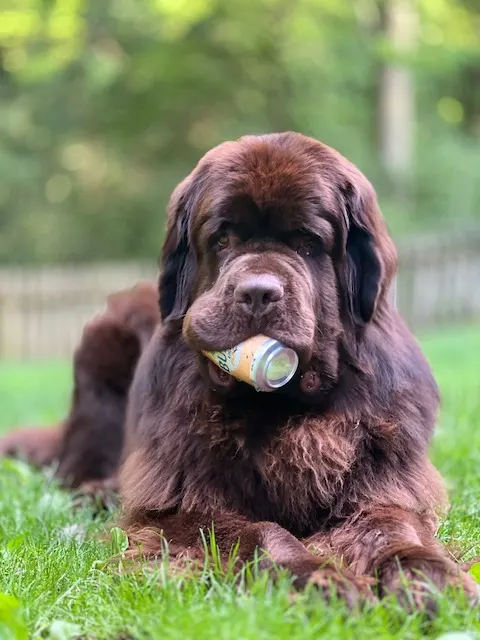
I like that he holds things in his mouth and carries items.
I don’t want to train that out of him but I do want to modify it.
I don’t want him grabbing my arm, pinching me with his teeth or picking up something that could harm him.
So I’m training him in steps which include things like drop it, trade and take it.
I’m not trying to train the mouthy out of him, I’m trying to train him to use his mouth the correct way.
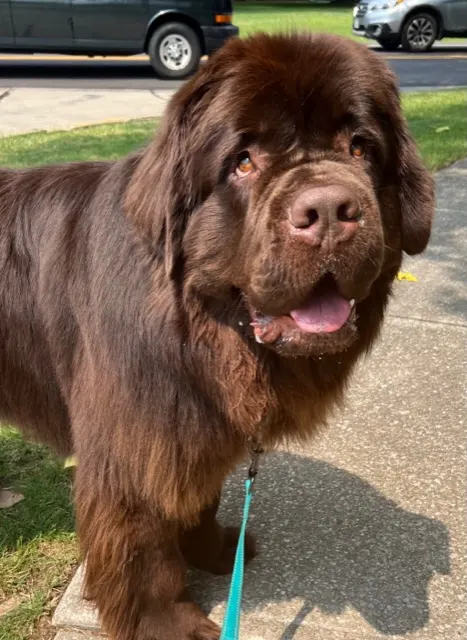
Women’s Best Friend
Another common characteristic that is often overlooked is how devoted a Newfie is to their family.
A Newfie is always happiest by their family’s side.
A Newfie that is left alone or left outside by itself for hours is an unhappy Newfie and can become destructive and unruly.
This doesn’t mean that if you work an 8-hour day that you can’t have a Newfie, you just need to be prepared to spend the rest of your time WITH your Newfie.
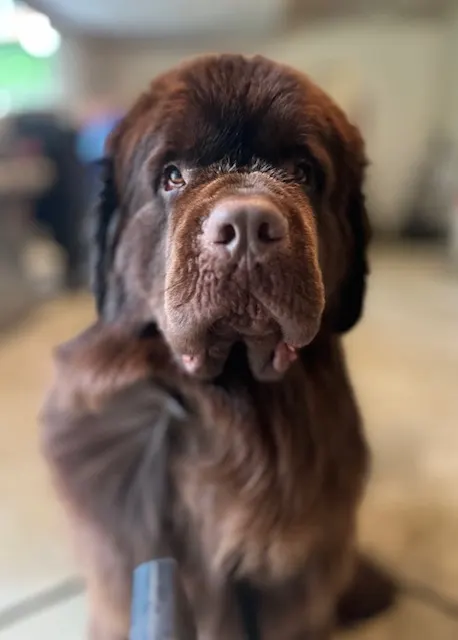
Limited Availability
And lastly, limited availability.
You can find a Newfie anywhere but good breeders in the Newfie world are hard to find right now.
Not only did many breeders retire but a lot of them just aren’t planning litters as often.
If adding a Newfie to your family is even an option, you need to plan way in advance.
Most waiting lists right now are 1-2 years.
I don’t know if backyard breeders have increased more over the last 3 years or if they’re just more visible due to social media and the lack of good breeders.
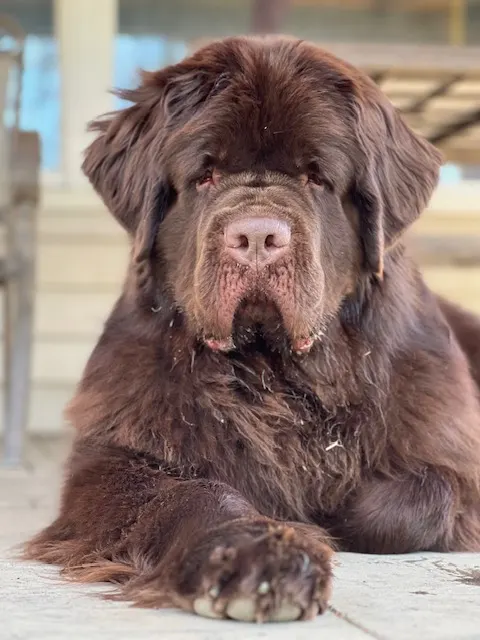
Lack of Mentors
Any new Newfie owner should have a mentor or a pocket full of them.
If that’s not your breeder, it should be someone that is familiar with the breed and owns one or has owned them in the past.
I was lost before I found some good mentors.
A good mentor is going to listen to you and try to provide solutions.
They are not going to shame or belittle you or your Newfie.
You can find mentors on social media, at dog shows, at local dog events, or at dog classes.
You can speak to your breeder, veterinarian, dog groomer, dog trainer or even someone involved in a breed-specific rescue group.
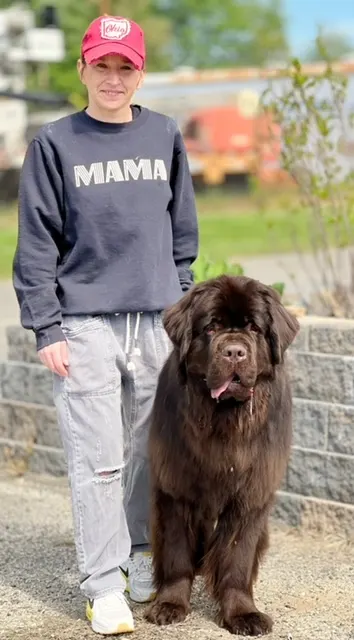
Conclusion
Newfies are the perfect breed for me and I wouldn’t change a thing about any of my Newfies but they are not the perfect dog for everyone.
Taking the time to research the breed and learn about them is essential to comfortably share your life with them.
You need to look beyond the pretty pictures and perfect descriptions and dive into the behind scenes.
There are SO many of us raising adolescent Newfies right now and we’re showing the scenes to anyone that cares to watch.
In one of my discussions on Facebook about this topic, someone said that, compared to other breeds, there are not many red flags when it comes to learning about some of the challenging parts of raising a Newfoundland.
Emily Cooperman
Monday 2nd of October 2023
This is really important - I'm glad you wrote this. They are a huge commitment in all the ways you talk about and people need to understand that. Our girl is just about to be 3 and what a relief it is that she has finally grown up to be the dog I was hoping for. She was by far the most challenging puppy I have ever raised, and I remember feeling astonished that she had learned anything in training. I think it's hard to understand that you can't just tell Newfs what to do. You have to work WITH them in training.
Karen Coyle
Sunday 6th of August 2023
I really appreciate the mouthing guidance. We are training release it which is drop it. But trade it and hand it are good. I’ll start to try those as I don’t want to train the mouthy out if her.
Jen
Thursday 10th of August 2023
You're welcome! I had a lightbulb moment a few months ago when I was trying to train it out. I started using trade because I noticed that he was starting to show a small sign of resource guarding his toys. Instead of taking something I way, I offer him a trade of something that is higher value to him. It's been working really good and I've made that everyone in my family does the same thing so we're consistent.
Annie
Sunday 6th of August 2023
As a vet tech with a newfie, try raising the deductible on your pet insurance to make the premiums more affordable. I have a 6-year-old girl and doing that took her premium down to $30/month. I just keep the deductible amount in a separate savings account for her.
Jen
Thursday 10th of August 2023
I have my deductible at $1,000 right now for the Newfies so maybe I should raise it some more. Thank you for the tip Annie!
Larry Fredrickson
Thursday 3rd of August 2023
A lifestyle change. That is the key to having the privilege of owning a giant breed dog. We have both a Newfie (8 month old female) and a St Bernard (18 month old female). Everything about our lives had changed, and all for the richer. Even the backseat of my car needed to be removed so I could build a platform for them when we travel. All our trips include them both. They both go to doggie day care once a week for socialization. On those days we don't go off and do errands, but instead go home and do additional vacuuming and wall cleaning above and beyond our daily routines. Are they worth the enormous changes in our lives? Absolutely! Could not imagine our lives without them.
Amy Killebrew
Thursday 3rd of August 2023
Wonderful article. Our Newfoundland will be 9 this November. She is our world.